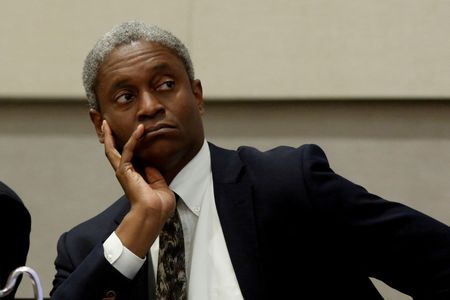 1
1 1
1
By Padraic Halpin
DUBLIN (Reuters) -The Federal Reserve will have to increase rates if prices growth moves away from target or inflation expectations start to move in “a difficult way”, Atlanta Federal Reserve President Raphael Bostic said, while adding that neither was happening right now.
While Chair Jerome Powell said on Thursday that most Fed policymakers expect they will need to raise rates at least twice more by year’s end, Bostic is not one of them and he reiterated his view that they should hold steady for the rest of 2023.
Citing what he saw as a plateauing of core inflation and measures that suggest inflation has started to “really get much more into the range of normal”, Bostic said rate-setters had time to wait and let their policy work.
“I don’t see as much urgency to move as stated by others, including my chair,” Bostic told reporters ahead of a speech at the Irish Association of Investment Managers.
“I do recognise that if inflation moves away from target or seems to significantly stall out, then we’ll probably have to do more or if inflation expectations start to move in a difficult way, we might have to do more.”
“We’re not seeing either of those right now and as a consequence, I’m comfortable waiting … If I see signs that it is moving away, I’ll be right in the front of the line to say we need to move rates higher, we need to be aggressive.”
Earlier this month, the Fed refrained from boosting its federal funds target rate for the first time since it started raising rates in March 2022, leaving it at between 5% and 5.25%.
Powell this week also kept open the possibility of hiking rate at successive meetings. Bostic said there are undoubtedly scenarios where that could happen, but they are unlikley.
He added that there has been a decided change from employers in the last eight weeks regarding the difficulties hiring staff and that while labour markets are still tight, they are not “horrific tight” and closer to pre-pandemic levels.
Data released after Bostic spoke showed that new claims for unemployment benefits unexpectedly fell last week, while first-quarter gross domestic product growth was revised up, increasing the chances of a July rate hike, according to the CME Group’s tool.
(Reporting by Padraic HalpinEditing by Mark Potter and Chizu Nomiyama)